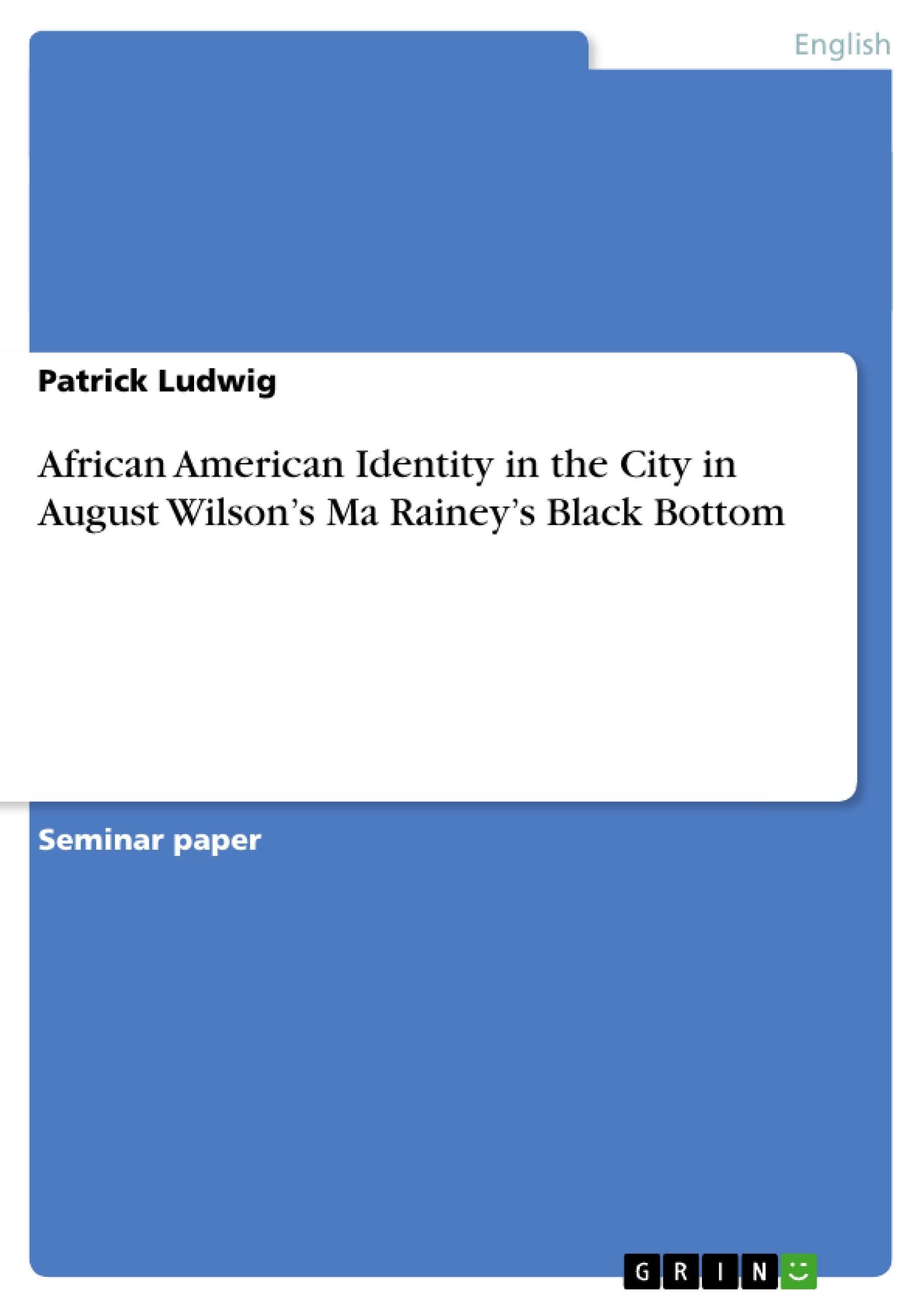This paper will be concerned with the possible ways of construction of identity or the loss of identity – particularly the African American identity – in the modern metropolis as it is described in August Wilson’s play Ma Rainey’s Black Bottom. Which ways to construct a proper identity present themselves to the characters in the play and what will happen when they fail to acknowledge and accept these ways? In this regard, I will examine the relevance of music, society, and Christian religion.
Chapter Two will show that it is essential for the understanding of the alienation of the individual, in this case specifically the alienation of the African American musician, to take into consideration the differences between rural South and urban North and the different kinds of music connected to them. From the contrast of South and North, i.e. rural and urban springs the conflict between the old, down-home blues and the new, urban blues, which will later become swing or jazz respectively. The chapter will further address the question which impact this conflict will have on the life scripts of the individual characters. Moreover, the connection between the musician, his instrument, and the music will be examined and explained.
Chapter Three will explore the various facets of alienation and their respective sources in more detail. Moreover, it will identify and further illuminate possible ways of forming identity and which processes endanger and impede the formation of identity. Therefore, it is first necessary to diagnose how Wilson and his characters’ actions describe the urban environment. Do these actions benefit or harm the formation of identity or do they promote alienation? Can music, religion, or ancestral awareness help the city-dwelling individual to arrive at a full-rounded ontological definition of selfhood?
Chapter Four will summarise the findings of the previous chapters and evaluate them with regard to the questions raised in this introduction.
Inhaltsverzeichnis (Table of Contents)
- Introduction
- Expression and Formation of Identity through Music
- Authentic South vs. Economic North
- Music that Breathes and Touches
- The Urban Experience
- The City in Ma Rainey's Black Bottom
- How do the Play's Characters Serve to Describe the City?
- Alienation and Uprootedness
- The City as a Godless Place
- Conclusion
Zielsetzung und Themenschwerpunkte (Objectives and Key Themes)
This paper explores the construction and potential loss of African American identity in the modern metropolis, as depicted in August Wilson's play *Ma Rainey's Black Bottom*. The study investigates how characters navigate identity formation, the impact of failure to recognize and embrace these opportunities, and the role of music, society, and religion in this process. Key themes explored in the paper include:- The clash between traditional rural blues and modern urban blues as a reflection of identity formation.
- The influence of the urban environment on African American identity, including themes of alienation and uprooting.
- The role of music in expressing and constructing identity, and the connection between musicians, their instruments, and the music they create.
- The search for meaning and self-definition within the urban landscape, and the potential for music, religion, and ancestral awareness to contribute to this process.
Zusammenfassung der Kapitel (Chapter Summaries)
The introduction of this paper establishes the central question of how African American identity is constructed or lost within the context of the modern metropolis as portrayed in *Ma Rainey's Black Bottom*. It outlines the focus on music, society, and religion in examining this process. Chapter two analyzes the significance of the contrast between rural South and urban North in understanding the alienation of the African American musician. The chapter explores the conflict between traditional blues and modern urban blues and its impact on individual characters. The chapter also delves into the relationship between musicians, their instruments, and the music itself. Chapter three examines various facets of alienation and their sources in more detail. It explores potential pathways to identity formation and the factors that hinder this process. The chapter analyzes how Wilson and his characters depict the urban environment and its influence on identity formation. It investigates whether music, religion, or ancestral awareness can contribute to a sense of selfhood in the urban context.Schlüsselwörter (Keywords)
This paper examines the construction and potential loss of African American identity in the context of the urban environment. Key concepts include the influence of the city on identity formation, the role of music in expressing and constructing identity, the clash between traditional and modern music styles, themes of alienation and uprooting, and the potential for self-definition through music, religion, and ancestral awareness.- Quote paper
- Patrick Ludwig (Author), 1998, African American Identity in the City in August Wilson’s Ma Rainey’s Black Bottom, Munich, GRIN Verlag, https://www.grin.com/document/135216




